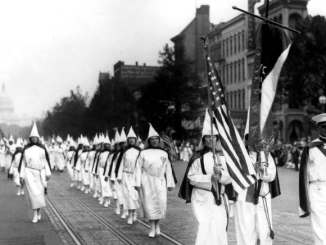
As populism is often associated with male conservative politicians, there is relatively little research on how influencers integrate concepts of populism into their own social media presence. Contemporary right-wing populist and nationalist movements and parties constitute a gendered backlash to the ills of neoliberal capitalist globalization and its attendant values. While populist processes often revolve around male personalities, there are exceptions, with increasing numbers of female alt-right politicians or activists celebrating widespread success with these rhetoric and tactics. However, these influencers promote a traditional view of women, with the highest esteem still lying in the role of mother and caregiver, complicating the relationship between the private and public sectors.
{snip}
Political identity refers to one’s own conception of political behavior and self-image. This can have several distinctions depending on ideological affiliation. For example, the alt-right movements revolve around the portrayal of a “white identity” and Western society. While these accounts explore its various ideological strands, there are two overarching cornerstones which pervade the majority of alt-right discourse: a realization that white identity is undergoing a crisis – which often includes discussion of an imminent ‘white genocide,’ and the rejection of feminism and female empowerment. White men have been instrumental in spreading these ideologies in their respective alt-right movements.
Following Donald Trump’s presidential victory in 2016, the alt-right movement garnered attention from the scientific community and academia, whose findings are becoming increasingly significant. The following polarization and increased visibility of extreme right-wing groups have led to a rethinking of right-wing extremism. Historically, research on right-wing extremism has focused primarily on male perpetrators, largely overlooking the role of women. However, recent developments highlight the active participation of women in these movements, prompting a reassessment of traditional gender roles within extremist circles.
Women have always been part of extremist or traditional movements or organizations. However, the assumption that their participation is not a result of assimilation into a male-dominated system but rather a personal decision is slowly changing. They occupy various roles within the alt-right landscape, including the controversial “trad wives,” who advocate for traditional gender roles as the only path to fulfillment, often using terms like “femininity” to bolster their rhetoric.
{snip}
Contrary to traditional portrayals of women as passive bystanders within male-dominated extremist circles, these influencers play a significant role in reshaping gender dynamics, constructing identities, and propagating extremist narratives. Leveraging the reach and accessibility of platforms like X, podcasts, and various social media channels, they cultivate dedicated followings and mainstream alt-right ideologies to a global audience.
Among the prominent figures in the alt-right landscape are Paula Winterfeldt, Lana Lokteff, and Lauren Southern. Winterfeldt’s association with Germany’s Identitarian movement and her promotion of campaigns like #120db exemplifies the fusion of “feminist” rhetoric with a racist agenda. #120db stands for “120 decibels” and is the name and hashtag of an internet campaign by far-right women associated with the Identitarian Movement. It attempts to mimic the successful non-right #MeToo campaign against sexism, urging women to share their experiences of violence perpetrated by refugees. Southern, a Canadian filmmaker, commands a substantial Twitter following, leveraging it to amplify alt-right ideologies. Meanwhile, Lokteff, co-founder of Red Ice Media – a white supremacist multimedia company – seamlessly merges alt-right activism with media production.
Despite their varying backgrounds and affiliations, these influencers share a fundamental anti-feminist ideology. While they often present themselves as independent and empowered, their rhetoric aims to reinforce traditional gender norms and combat what they perceive as the “erosion of femininity”.
{snip}
The rise of female alt-right influencers underscores the need for nuanced analyses that consider the intersectionality of gender, identity, and political extremism. By examining the motivations, strategies, and impact of these influencers, researchers can gain valuable insights into the evolving nature of extremism in the digital age. Moreover, understanding the allure of alt-right ideologies among women sheds light on broader societal dynamics and challenges prevailing assumptions about gender and radicalization.
The emergence of female alt-right influencers represents a paradigm shift in the study of extremism, necessitating interdisciplinary approaches that encompass gender studies, political science, sociology, and media studies.
{snip}
Despite their independence and apparent empowerment efforts they aim to empower only “white” women who adhere to their own racist ideals. In doing so, they devalue all members of the LGBTQI+ community and all people of color. While they openly criticize men within their own movement for sexist behavior, they do not show solidarity with the experiences of other women who do not share the same ideological views. Thus, alt-right ‘feminist’ influencers must not be considered as feminists at all.
Written by Anna-Maria Hirschhuber, Edited by Marlene Palan
